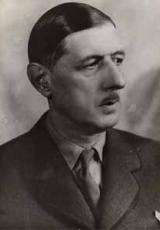Sir Winston Leonard Spencer Churchill
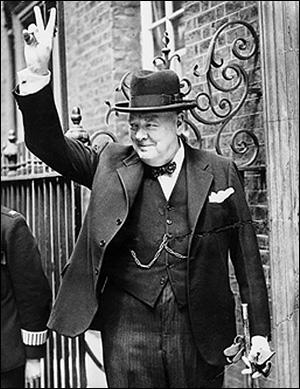
Blenheim, 30 November 1874 – London, 24 January 1965
Winston Churchill was a British politician descended from one of the greatest English aristocratic families, that of the Dukes of Marlborough.
Born on 30 November 1874, Winston Churchill was a mediocre student until he was admitted to Sandhurst military school in 1893. He graduated 20th out of 130 in 1896.
He fought against the Spanish in Cuba, India and Sudan, where he signed up with General Kitchener in 1898. In 1899, during the Second Boer War in South Africa, he was taken prisoner and managed to escape, an incredible story applauded by the domestic and international press. From then on, half officer and half journalist, he wrote lively, expressive articles that were highly appreciated, opening the doors to the House of Commons to him in 1900.
Elected to Parliament as a Conservative in 1900, he left the party and joined the Liberals in 1904, with whom he began a brilliant political career – he was appointed Under-Secretary of State for the Colonies in 1905, Trade Minister in 1908 and Home Minister in 1910.
In 1908, he met and married Clementine Hozier, with whom he had five children.
In 1911, at thirty-seven, he became First Lord of the Admiralty. He held this position at the outbreak of World War I.
In 1915, he prepared a Franco-British naval expedition against Turkey, Germany’s ally, to occupy the Dardanelles and to open up communication with Russia. But the landing at Gallipoli, in the spring of 1915, was an outright disaster that forced him to leave the government and nearly destroyed his career once and for all. He then briefly served on the French Front, commanding the 6th Battalion of the Royal Scots Fusiliers, but Lloyd George called him back to the government, entrusting him with the portfolio of Minister for Munitions (1917), then Secretary of State for War and Secretary of State for Air (1918-1921).
With the Liberal Party’s loss in 1922, Churchill lost his seat in Parliament. He returned to the Conservative Party, which welcomed him back with no hard feelings in 1924, naming him Chancellor of the Exchequer.
In the 1930s, he repeatedly warned, in vain, of the threat posed by Hitler’s Germany.
Thus, when Chamberlain signed the Munich Agreement in 1938, he said, "You were given the choice between war and dishonour. You chose dishonour, and you will have war."
In September 1939, Churchill was once again appointed First Lord of the Admiralty. After Neville Chamberlain’s resignation on 10 May 1940, he became Prime Minister of the United Kingdom. He proved to be a veritable war leader, firmly resolved to lead his country to victory and, in his inaugural speech before the House of Commons, announcing the dark days of the Battle of Britain, he declared, "I have nothing to offer but blood, toil, tears, and sweat".
At the age of 66, Churchill had managed to reach the summit of power for the first time, and he was to remain there until the end of the conflict. He played a crucial role in supporting the morale of the British. The man with his incisive speeches, his cigar and his ‘V for Victory” came to symbolise Britain’s resistance against Nazism. He organised the evacuation of the Dunkirk pocket, allowed de Gaulle to launch his famous “Appel du 18 Juin”, exalted the tenacity of the British people during the Battle of Britain ("Never in the field of human conflict was so much owed by so many to so few", Speech to the House of Commons, 20 August 1940), and made victory a non-negotiable necessity.
He had always been for cooperation with France, even though his relations with the leader of the Free French were often difficult despite the mutual respect the two men had for each other, but he did not hesitate to sink the French fleet at Mers el-Kébir to keep it from falling into Axis hands. Likewise, even though he was a fervent anti-Communist, he extended a hand to Stalin when the USSR was attacked by Germany on 22 June 1941, while signing the Atlantic Charter with Roosevelt in August 1941.
All his policies focused on a single goal – resisting Nazism and defeating Hitler, no doubt making him one of the main artisans of the allied victory.
At the end of the war, Churchill tried to convince Roosevelt to adopt a firmer attitude toward the USSR, but he was unable to stop the division of Europe between the Soviets and the Americans at the Yalta Conference in Ukraine.
In 1945, the elections were won by the Labour Party. Churchill became the leader of the Conservative opposition, denouncing the “Iron Curtain” in 1946 and insisting on the importance of the Commonwealth and privileged relations with the United States.
He was re-elected Prime Minister in 1951, turning the position over to Anthony Eden in April 1955. He dedicated the last years of his life to painting and literature.
Awarded the Nobel Prize in literature in 1953, Sir Winston Churchill wrote many books, including his War Memoirs (1948-1954), a priceless testimony to his extraordinary tenacity during one of the darkest periods in the history of Great Britain and the free world.
He died of a stroke in London on 24 January 1965, at the age of 90.
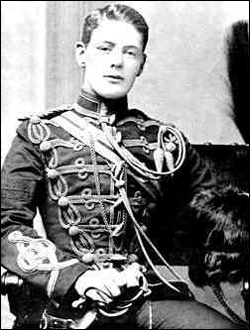
Churchill dans son uniforme de sous-officier des Hussards, en février 1895. Source : Wikimedia Commons. Libre de droit.
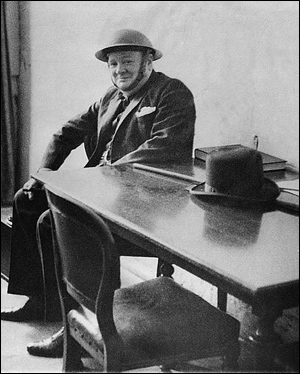
Churchill portant un casque lors d'un raid aérien d'avertissement dans la bataille d'Angleterre en 1940.
Source Library of Congress. Libre de droit
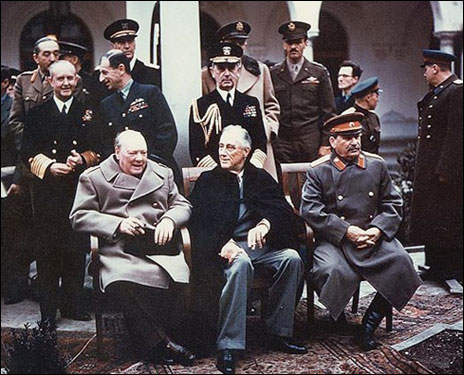
Winston Churchill à la Conférence de Yalta, au côté de Roosevelt et Staline, en février 1945.
Source : Gouvernement fédéral des États-Unis d'Amérique. Libre de droit


